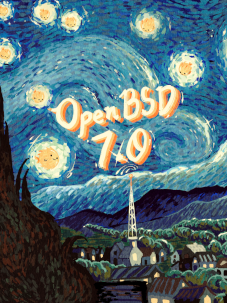OpenBSD 7.0


This is a partial list of new features and systems included in OpenBSD 7.0. For a comprehensive list, see the changelog leading to 7.0.
Also: OpenBSD 7.0 Released With RISC-V 64-bit Port, Better Apple Silicon Support
-

- Login or register to post comments
 Printer-friendly version
Printer-friendly version- 5645 reads
 PDF version
PDF version
More in Tux Machines
- Highlights
- Front Page
- Latest Headlines
- Archive
- Recent comments
- All-Time Popular Stories
- Hot Topics
- New Members
digiKam 7.7.0 is released
After three months of active maintenance and another bug triage, the digiKam team is proud to present version 7.7.0 of its open source digital photo manager. See below the list of most important features coming with this release.
|
Dilution and Misuse of the "Linux" Brand
|
Samsung, Red Hat to Work on Linux Drivers for Future Tech
The metaverse is expected to uproot system design as we know it, and Samsung is one of many hardware vendors re-imagining data center infrastructure in preparation for a parallel 3D world.
Samsung is working on new memory technologies that provide faster bandwidth inside hardware for data to travel between CPUs, storage and other computing resources. The company also announced it was partnering with Red Hat to ensure these technologies have Linux compatibility.
|
today's howtos
|









.svg_.png)
 Content (where original) is available under CC-BY-SA, copyrighted by original author/s.
Content (where original) is available under CC-BY-SA, copyrighted by original author/s.

OpenBSD 7.0 released, Oct 14
OpenBSD 7.0 released, Oct 14
In Slashdot tonight
OpenBSD 7.0 Released (openbsd.org)
OpenBSD 7.0 adds 64-bit RISC-V, improves Apple Arm silicon..
OpenBSD 7.0 adds 64-bit RISC-V, improves Apple Arm silicon support
OpenBSD 7.0 Release Brings in Improved Apple M1 Support...
OpenBSD 7.0 Release Brings in Improved Apple M1 Support and Adds More Platforms
OpenBSD 7.0 now also on RISC-V, progress with Apple M1
OpenBSD 7.0 now also on RISC-V, progress with Apple M1 [Ed: Automated translation from German]